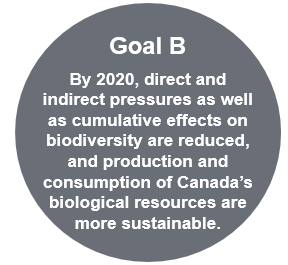Canada Target 12. By 2020, customary use by Aboriginal peoples of biological resources is maintained, compatible with their conservation and sustainable use.
About the Target
For thousands of years, Indigenous peoples in Canada have depended on the land, water, and ice to meet their physical, social, cultural and spiritual needs. Indigenous peoples continue to have intimate cultural relationships with the environment through customary activities such as hunting, fishing, and trapping.
Customary use of biological resources is protected by Aboriginal and Treaty rights, which are recognized and affirmed by Section 35 of the Constitution Act, 1982. Modern treaties covering over 50% of Canada’s land mass also recognize the rights of Indigenous peoples in wildlife harvesting, the establishment and management of national parks and conservation areas, and natural resource management. A growing number of agreements with Crown governments establish Indigenous-led structures for managing biological resources, including decisions over customary use.
First Nations, Inuit, and Métis are actively involved in various activities that promote customary practices compatible with conservation and sustainable use of biodiversity. Among these are various types of food harvesting, instruction on customary skills and knowledge, and ecosystem management practices. Many Indigenous peoples rely on traditional foods such as land- and water-based mammals, freshwater fish, game birds and berries.
Canada Target 12 is linked with the following global Aichi target under the United Nations Convention on Biological Diversity Strategic Plan for Biodiversity 2011-2020:
Aichi Target 18 -By 2020, the traditional knowledge, innovations and practices of indigenous and local communities relevant for the conservation and sustainable use of biodiversity, and their customary use of biological resources, are respected, subject to national legislation and relevant international obligations, and fully integrated and reflected in the implementation of the Convention with the full and effective participation of indigenous and local communities, at all relevant levels.
2020 Final Assessment
The Aboriginal Peoples Survey shows about a third of Indigenous peoples are involved in hunting, fishing, trapping, or gathering wild plants. Results also show no change between 2012 and 2017.[i] There is a relatively high rate of sharing and use of traditional foods, but trends are uncertain.[ii]
It is uncertain if the target has been met. While some of the survey information indicates a steady level of participation in traditional use of wildlife, direct comparison between years is difficult as is obtaining standardised results across the practices of all Indigenous peoples in Canada. Historically, the direct and indirect impacts of colonization have significantly affected Indigenous peoples’ access to traditional foods, and there is evidence that pollution and climate change impacts are having a further role.
[i] Statistics Canada (2021) Reasons for harvesting, by Aboriginal identity, age group and sex. Table: 41-10-0046-01. Statistics Canada (2015) Aboriginal peoples survey, harvesting activities by Aboriginal identity, age group and sex, population aged 15 years and over, Canada, provinces and territories Table: 41-10-0026-01
[ii] The First Nations Information Governance Centre (2012) First Nations Regional Health Survey (RHS) 2008/10. The First Nations Information Governance Centre (2018) The First Nations Regional Health Survey Phase 3: Volume Two
Contributing Actions
Canada continues to support traditional hunting and harvesting through the Harvesters Support Grant and the Young Hunters Program. Developed in collaboration with Indigenous partners, the Harvesters Support Grant increases access to country foods by providing funding to support traditional hunting, harvesting and food sharing in isolated communities. The Harvesters Support Grant is part of the Nutrition North Canada program and was initiated in 2020, providing $40 million over 5 years and $8 million per year in ongoing funding, to Indigenous governments and organizations representing eligible communities. The Young Hunters Program is a community-based initiative led by the Aqqiumavvik Society in Arviat, Nunavut. The program connects youth with Elders to learn hunting and survival skills, while learning how to monitor and adapt to the impacts of climate change. In 2020, $1.2 million was allocated for up to 4 years under climate change adaptation funding.
Initiated in 1992, Canada’s Aboriginal Fisheries Strategy (AFS) is ongoing and has provided for negotiated arrangements with Indigenous communities and organizations on the management of Indigenous food, social, and ceremonial fisheries, and facilitates participation in local management initiatives such as seasonal fishery planning, stock assessment, monitoring, and habitat restoration. Annual funding of the AFS is $35 million, with about 125 AFS agreements signed each year. The AFS and other Fisheries and Oceans Canada Indigenous collaborative management programs contribute to the employment of over 1,600 Indigenous people, working as biologists, fisheries managers, technicians, and designated Aboriginal Fishery Guardians.
The First Nations Food, Nutrition & Environment Study (FNFNES) was the first comprehensive study to address knowledge gaps about the nutritional adequacy, quality and safety of traditional foods. Declines in the health of the environment can affect the quality of Indigenous foods and, combined with social, economic, political and cultural factors, can restrict availability or curtail access.
The study is based on household interviews of First Nations adults living on reserves south of the 60th parallel and covers: tap water sampling for metals; surface water sampling for pharmaceuticals; hair sampling for mercury; and traditional food sampling for contaminants. The findings showed systemic problems relating to food, nutrition and the environment affecting First Nations. Recommendations were put forward based on the study results and input from Indigenous peoples and Indigenous health organizations. In addition to supporting Indigenous leadership, the use of Indigenous Knowledge and capacity building, the recommendations emphasize the need to address climate change, habitat loss, pollution and other environmental stresses.

